|
My predecessor, Todd Hubing, had (supposedly) drawn heat
from the Chief (a.k.a. Janet O’Neil) for using EMC
songs, sonnets and sundry satires to headline his Chapter
Chatter articles. The Chief’s editorial focus groups
never included me – I loved Todd’s prose. But,
the Chief is the Boss and when I took over this endeavor,
it was my intent to use only “real life” EMC stories.
The Chief couldn’t come after me for writing about
real life EMC, could she? OK, so my versions of “real
life” EMC stories are slightly embellished to enrich
and highlight the drama of the situations. Nevertheless,
the stories are (mostly) true. All of this is just a long-winded
effort to cover my backside. I am violating the Chief’s
editorial “policy,” kind of. I have a true EMC
story about an EMC song.
The following is a brief, but true story about a retirement
party held at my company in 1996. A really great guy and
talented engineer by the name of Roger McConnell was retiring
after a distinguished 34 year career in electromagnetics,
24 years at the Stanford Linear Accelerator and 10 years
at CKC Laboratories. During his tenure with us, Roger made
numerous outstanding contributions, including development
of equations for coupling between tuned dipole antennas
for the purpose of loss determination. Roger’s equations
have also been central to papers on fully anechoic chambers
presented jointly at IEEE EMC Symposia. He was affectionately
dubbed “Mr. Math” after one of his symposium presentations.
At Roger’s little send off into retired bliss, we discovered
that he is not only a superb engineer; he is also a talented
musician. Roger performed the following piece in unaccompanied
vocal.
The EMC Professional
(with apologies to Gilbert & Sullivan’s “Major
General”)
I am the very model of an EMC Professional,
About antenna calibration I am called obsessional.
I know the regulations from the FCC and VDE,
With smatterings of knowledge on Austel and also BZT.
I’m very well acquainted too with double exponentials,
I calculate the energy of damping sinusoidials.
In short, in matters technical and legal and tutorial
I am the very model of an EMC Professional!
When filters are not filtering and cable shields are fraying
And interfering ambients are proving most dismaying,
Instead of heading quickly for the nearest priest’s
confessional,
Pick up your telephone and call the EMC Professional!
I’ll fix your interference in a moment with astounding
skill
And render for my services a perfectly astounding bill.
In short, in matters technical and legal and tutorial
I am the very model of an EMC Professional!
Aside: I am sure that you noticed the dated agency references
in Roger’s ditty. It’s amazing how much has changed
in nine years.
|
Austria
On March 31st, the IEEE EMC Chapter in Austria, the Institute
for Electronics (TU-Graz) and the Seibersdorf EMC Test Laboratory,
organized the well-attended “EMC Meeting 2005” at the
University of Technology in Graz. The following topics were presented
and discussed:
-
Integrated measurement systems (Rohde &
Schwarz)
-
EMC of vehicles (Magna Steyr)
-
The new Automotive EMC directive 2004/104/EG
(Seibersdorf Research Center)
-
Immunity of integrated circuits (Austria
Microsystems, TU-Graz)
-
Design of filters in automotive applications
(Würth Elektronik)
-
Design of filters using LT-Spice (Würth
Elektronik)
-
Changes in the standards EN 61000-4-X (UEI)
During the lunch break and after the presentations,
the audience had many discussions and visited the vendor exhibition
area.
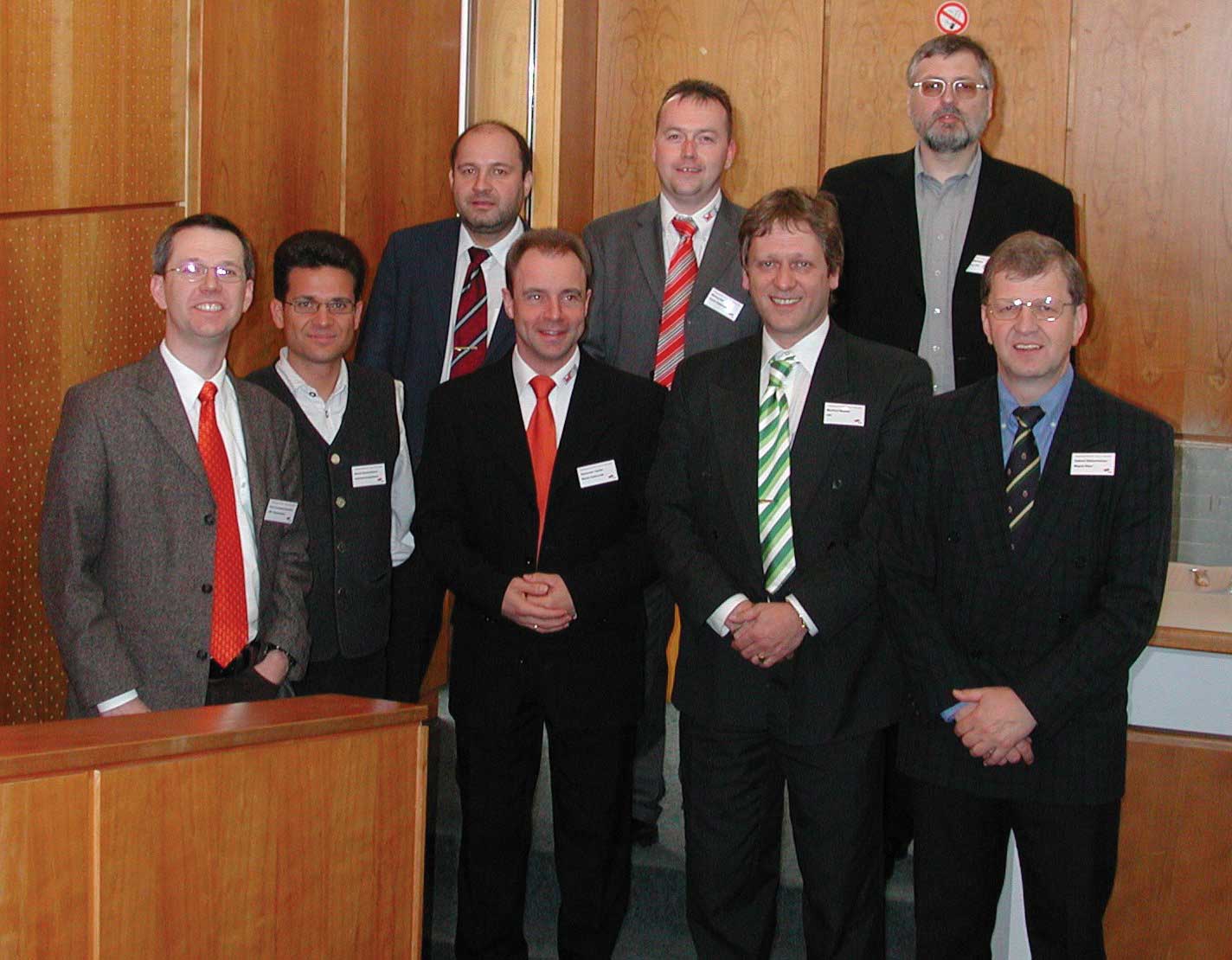 |
| Austria EMC Chapter members and speakers
at the “EMC Meeting 2005,” included (from left)
Lamedschwandner (Seibersdorf), Deutschmann (austriamicrosystems),
Sutter (Rohde & Schwarz), Gerfer (Würth), Stark (Würth),
Wallner (UEI), Winkler (TU-Graz), and Stabentheiner (Magna
Steyr). |
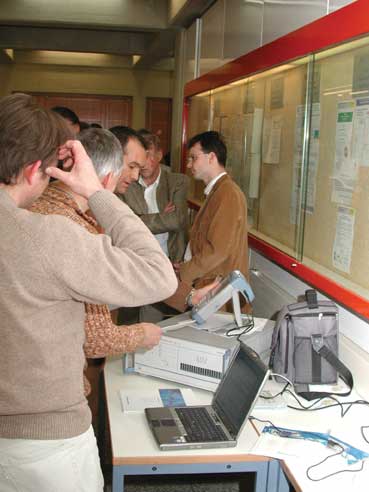 |
| Lunch break in the exhibition area
at Austria’s “EMC Meeting 2005.” |
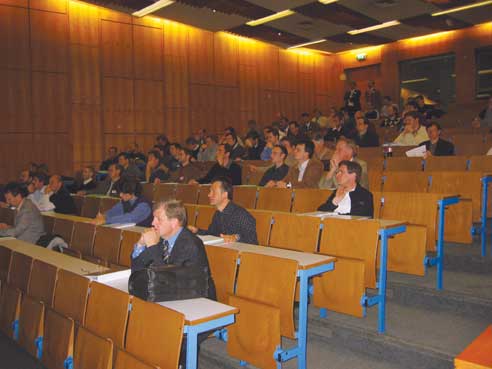 |
| Over 80 people participated in the
one-day EMC event organized by the Austria EMC Chapter. |
Chicago
Frank Krozel reports that there was standing room only at the
April meeting of the Chicago EMC Chapter. Held at Elite Electronic
Engineering, speaker Ed Hare, W1RFI, had the audience in awe,
talking about Broadband Over Power Lines (BPL) Communications,
and how it is working. Ed also covered many standards that are
applicable. (Is it a coincidence that this topic also appears
in the EMC Standards Activities article on page 29 of this Newsletter?)
Many new faces were seen in the audience, and many amateur radio
operators from the Illinois and Wisconsin areas attended this
special meeting. The crowd was estimated to number over 60 people!
The Chicago Chapter is very busy planning for the 2005 IEEE International
Symposium on EMC to be held over August 8-12 in the famous “Windy
City.” All are encouraged to attend! For more information,
visit www.EMC2005.org.
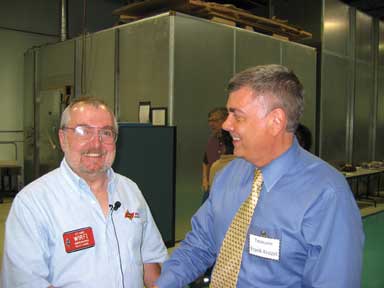 |
| Ed Hare of the American
Radio Relay League (left) and Frank Krozel of Electronic Instrument
Associates chatted before the April Chicago Chapter meeting. |
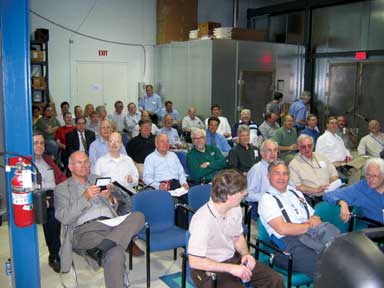 |
| Speaker Ed Hare drew quite an audience
at the Chicago Chapter meeting held at Elite Electronic Engineering. |
 |
| A lively question and answer period
followed Ed Hare’s presentation to the Chicago Chapter. |
 |
| Carla Robinson and Bob Hofmann compare
notes at the Chicago Chapter meeting. |
Eastern North Carolina
Chapter Chair Glenn Robb of Research Triangle Compliance Engineering
and Chapter Vice-Chair Dave Guzman of EMC Technologists enlisted
the talent of speakers Lee Hill of Silent Solutions and Bruce
Archambeault of IBM for their March 9th one-day Colloquium and
Exhibition on EMC. With the now “famous” title of “The
Bruce Lee Show”, these speakers in all seriousness spent
one full day presenting “EMC Design Concepts and Applications
for the Real World” to the rapt attention of some 70 attendees.
Scheduled to follow the EMC Society Board of Directors meeting
at IBM in Research Triangle Park on March 8, the Colloquium and
Exhibition was held at the Hilton Raleigh/Durham Hotel nearby.
This allowed many Board members the opportunity to stay an extra
day in the area and attend this event. The networking was very
interesting as a result! 20 exhibitors were on hand to display
the latest in EMC related products and services. During the reception
in the exhibition area, a raffle was held for several great prizes
donated by the Chapter and also the exhibitors. The speakers arrived
at the reception in festive attire to the delight of many. Business
attire by day, Kung fu attire by night! After the full day, the
Chapter Officers were tired, but pleased with the outcome: many
engineers left having learned practical EMC techniques that they
could use the next day on the job! Incidentally, a few nights
before the Colloquium, the Chapter held a meeting on March 7 with
Todd Hubing as the speaker. Todd’s presentation was titled:
“The Top 10 EMC Questions (and Answers).” This was a
very well received topic being both educational and entertaining.
The Chapter wishes to thank the EMC Board of Directors for visiting
Raleigh and for participating in many of the Chapter’s activities
while in town.
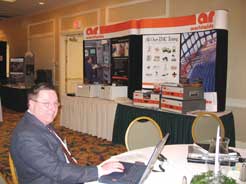 |
| John Whitney of AR Worldwide caught
up on some work during a quiet time at the Colloquium. |
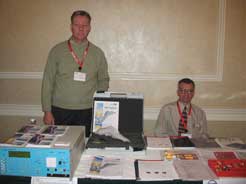 |
| Leo Makowski of HV Technologies (left)
and Dave Guzman of EMC Technologists, Eastern North Carolina
Chapter Vice-Chair, visited during the Chapter’s one-day
Colloquium and Exhibition. |
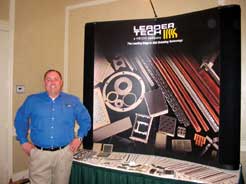 |
| John Ball of Leader Tech was one
of the many exhibitors at the Eastern North Carolina Colloquium
on March 9. |
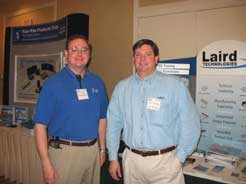 |
| Trip Kreger of Fair-Rite Products
Corp. (left) and Kevin Saurage of Laird Technologies participated
in the Eastern North Carolina EMC Chapter’s one-day Colloquium
and Exhibition. |
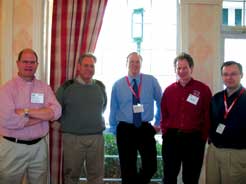 |
| Mack Davis of G-Mag, Kimball Williams
of Denso, Jack Black of DLS Electronics, Lee Hill of Silent
Solutions, and David Johns of Flomerics (from left) enjoyed
the networking opportunities at the Eastern North Carolina
Chapter event. |
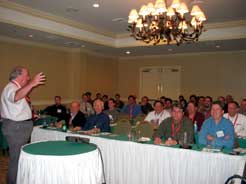 |
| Bruce Archambeault of IBM drove home
a technical point during the “The Bruce Lee” show. |
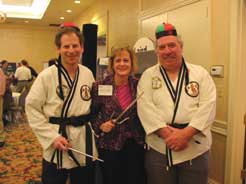 |
| Janet O’Neil of ETS-Lindgren
enjoyed the dramatic attire of the speakers at “The Bruce
Lee Show”, namely Lee Hill (left) and Bruce Archambeault,
in Eastern North Carolina. |
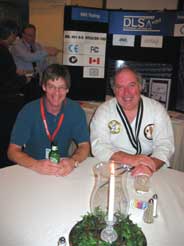 |
| Guy de Burgh of Mentor Graphics (left)
visited with Bruce Archambeault during the reception held
following the Eastern North Carolina Chapter Colloquium. |
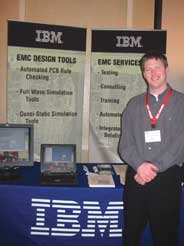 |
| IBM’s Sam Connor staffed his
company’s tabletop display at the March 9 Chapter event. |
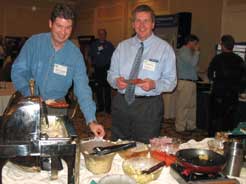 |
| Rich Spangenberg of Square D (left)
enjoyed the lunch buffet in North Carolina along with Doug
McKinnon of EMSCAN. |
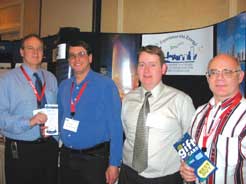 |
| Jack Black networked with Mark Montrose
of Montrose Compliance Services, Glenn Robb of Research Triangle
Compliance Engineering, Eastern North Carolina Chapter Chair,
and Larry Leise of IBM (from left). Larry won the raffle prize
of a Best Buys gift card. |
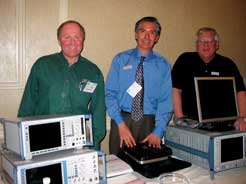 |
| Jim Skelly of Cybershield joined
Bob Rodriguez and Dortch Walker of Rohde & Schwarz (from
left) at the March 9 Colloquium and Exhibition. |
Germany
Dr. Frank Gronwald reports that at the beginning of April, the
German EMC Chapter held an officer meeting at Airbus Industries
in Hamburg where Treasurer Robert Kebel welcomed Chair Frank Sabath,
Vice Chair Jan-Luiken ter Haseborg, and Secretary Frank Gronwald.
One of the main topics was to plan and discuss forthcoming EMC
events. Dr. Sabath announced the names of outstanding and well-known
EMC experts that already have agreed or intend to speak at future
German Chapter meetings, including Carter, Joffe, Pommerenke,
Holloway, Archambeault, Brenner, Williams, Drozd, and Hubing.
It certainly is exciting to think of EMC events with speakers
like these! The German Chapter also plans to initiate and strengthen
activities of the IEEE student branches. It is hoped that in this
way more prospective researchers will find their way to the IEEE
and enjoy its scientific and social benefits. Benefits such as
listening to thoughtful presentations on EMC are surely valuable!
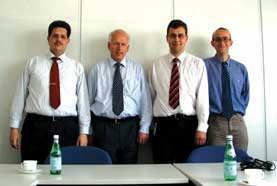 |
| Frank Sabath, Jan-Luiken ter Haseborg,
Robert Kebel, and Frank Gronwald (from left to right) conduct
a German EMC Chapter officer meeting with ties and plain mineral
water. |
Milwaukee
This past year for the Milwaukee EMC Chapter has provided our
members with many opportunities for learning and, of course, socializing.
The year started with a very well attended fall dinner meeting
capped by a presentation with Mr. Doug McKinnon of EMSCAN, LLC.
Discussion centered on the topics of spectral scanning and spatial
scanning. Over 30 IEEE members attended and observed a demonstration
utilizing a 433 MHz transmitter. Both the final FCC certified
production unit and a pre-compliance unit were compared with observable
results. As the holiday season approached, socialization came
together with an IEEE Milwaukee Section Family Holiday Party at
the Milwaukee Public Museum. Over 160 attendees consisting of
both members and student members from several local universities
participated. Dinner was served on the 2nd floor of the museum
among the African dioramas. This was a welcomed environment, dining
with the Lions, Elephants and Thompson Gazelle’s on a brisk
snowy night. After the holiday season, planning went into full
swing for the Spring 2005 EMC Educational Seminar. The efforts
were rewarded with a record attendance, both for attendees and
vendors. This is the fourth year the Milwaukee EMC Chapter has
sponsored an educational seminar and the consistency of this seminar
is being rewarded. For the record, 143 engineers registered for
the seminar. Of the 143, 79 were IEEE members. 19 vendors staffed
tabletop displays, adding another 31 attendees. For lunch, 178
were served. Our speakers were Dr. Bruce Archambeault of IBM and
Mr. Lee Hill of Silent Solutions. Their enthusiasm and presentation
style brings a credibility that can only be summed up by our post
seminar survey responses. After the seminar, 122 surveys were
turned in. A resounding 121 indicated that they would return next
year for another EMC Chapter sponsored seminar. 61 responses graded
our speakers as “excellent.” In addition, free form
comments included: “outstanding value”, “Dr. Bruce’s
presentation was incredibly useful” and “best seminar
I have attended in several years”. Planning for our 5th educational
seminar has already started. Following the EMC Educational Seminar,
the EMC Chapter sponsored an early spring evening of networking
with IEEE Student Members at Marquette University. The guest speaker
was Mr. Russell Harrison of IEEE USA. The Milwaukee Chapter encourages
all Chapters and sections to consider scheduling Mr. Harrison
as a speaker. IEEE USA is a branch of the IEEE dedicated to lobbying
the US Congress on behalf of the US engineering profession. His
presentation on student visa’s and immigration laws with
their impact on the US engineering job market kept everybody’s
interest well past 10:00 pm. The next scheduled activity for all
members of the Milwaukee EMC Chapter is attending the 2005 IEEE
International Symposium on EMC in Chicago. See you all at Navy
Pier in August!
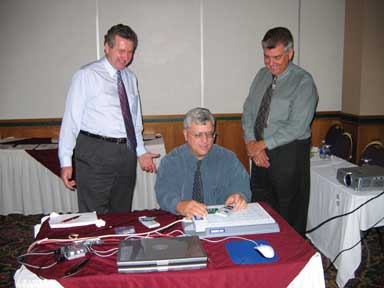 |
| (From left) Doug McKinnon of EMSCAN
and Frank Krozel of Electronic Instruments Associates had
fun with Jim Blaha, Milwaukee Chapter Chair, and his alignment
techniques. |
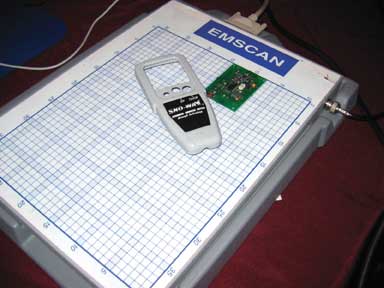 |
| EMSCAN in action with a 433 MHz transceiver. |
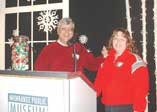 |
| Jim Blaha, Milwaukee Chapter Chair,
congratulates Sylvia Wrate of Rockwell Automation/Allen Bradley
on her Chairing of the 2004 Holiday Party Committee. |
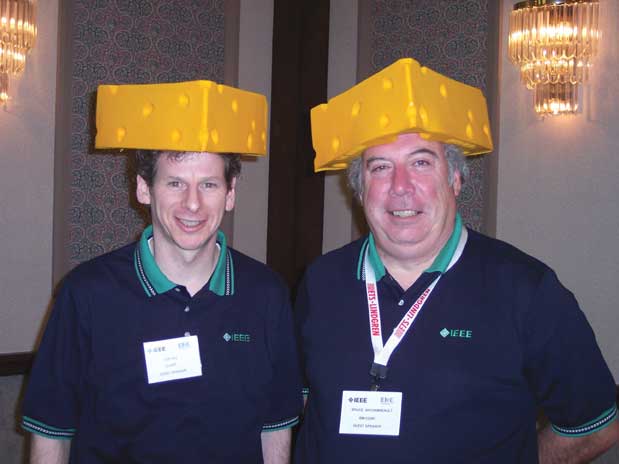 |
| Lee Hill of Silent Solutions and
Bruce Archambeault of IBM (right) are now “Honorary Cheese
Heads” (and with full honors) in Milwaukee. |
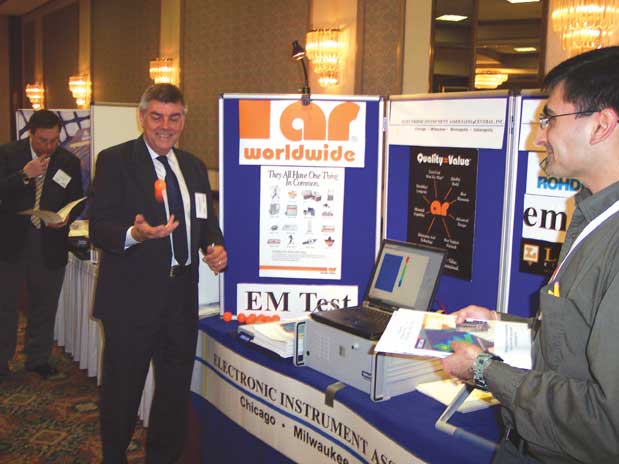 |
| Frank Krozel of Electronic Instruments
Associates…… “Look – Gravity” |
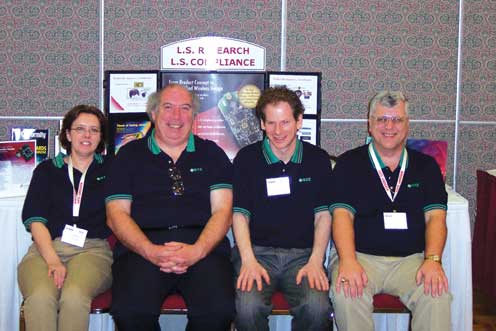 |
| The 2005 Milwaukee EMC Seminar Committee
(from left) included Teresa White of L. S. Compliance, Dr.
Bruce Archambeault of IBM, Lee Hill of Silent Solutions, and
Jim Blaha of L. S. Compliance. Absent are: Janet O’Neil
of ETS-Lindgren and Ron Borowski of Quad-Tech Industries. |
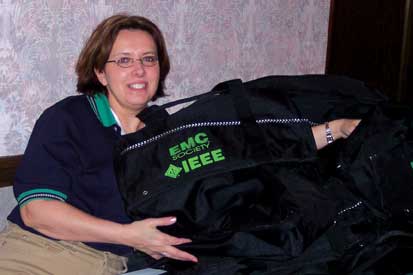 |
| Teresa White of L. S. Compliance
stuffed the duffle bags that were provided to all that returned
a seminar survey. |
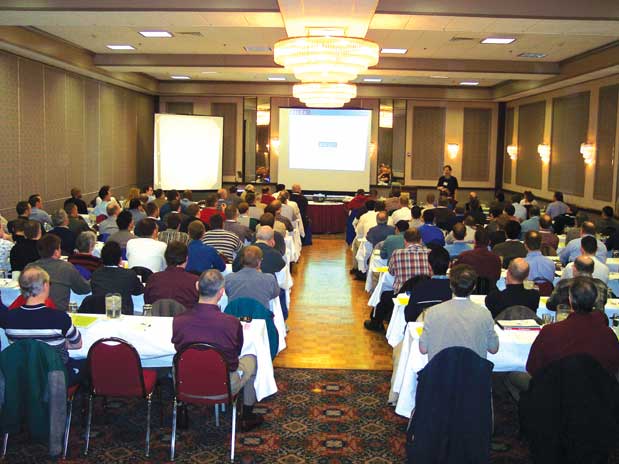 |
| There was seating for 160 and only
a few empty chairs at the Spring 2005 EMC Educational Seminar
in Milwaukee. |
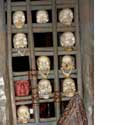 |
| Find Val Werner of Wisconsin Electric
Corp. among the Polynesian exhibits at the Milwaukee Section
Holiday Party! |
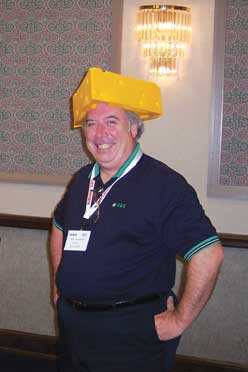 |
| Hey Bruce, say … “Cheese” |
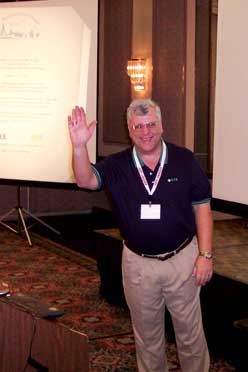 |
| Jim Blaha, Milwaukee EMC Chapter
Chair, concluded the Seminar by saying, “Thank you for
attending and we’ll see you next year.” |
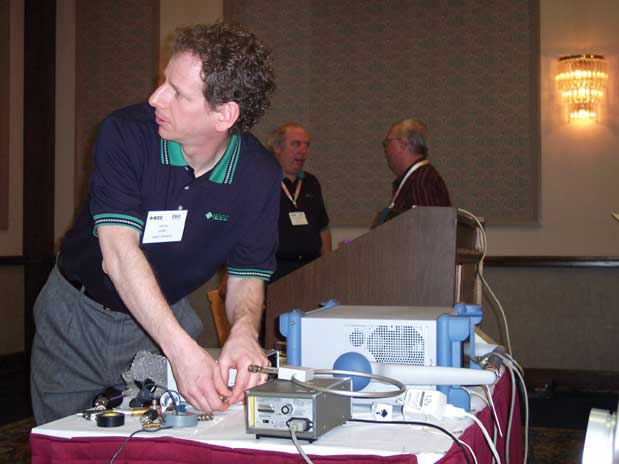 |
| Lee Hill challenged the Milwaukee
Chapter audience with another example of “Learning through
Experimentation.” |
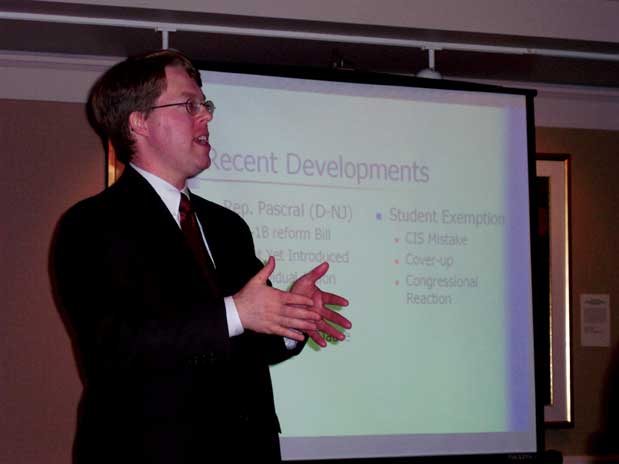 |
| Mr. Russell Harrison of IEEE USA
discussed immigration laws and how you can participate in
the next “IEEE USA Fly-in” in Washington, DC. |
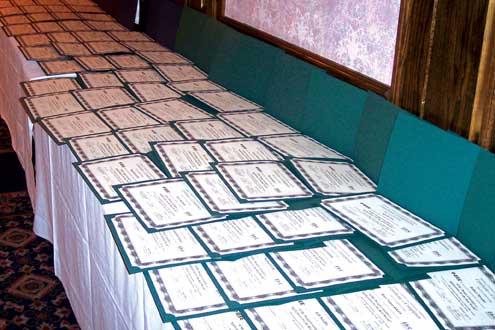 |
| 147 certificates of attendance were
ready for distribution following the Milwaukee Seminar! |
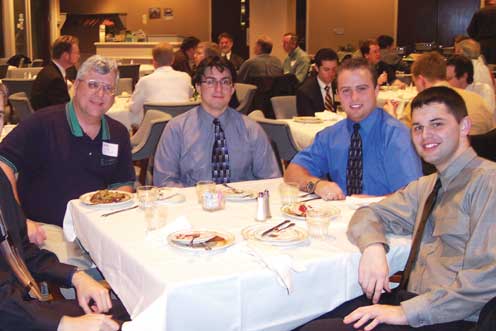 |
| Jim Blaha discussed career choices
and job interviewing techniques with students from the Milwaukee
School of Engineering. |
Oregon and SW Washington
Sidney Chan, Chapter Vice Chair, reports that the Oregon and SW
Washington Chapter continued their tradition of excellent technical
presentations. Pat André came down from Seattle in January
to kick off the New Year. Mr. André is the current chair
of the EMC Society Seattle Chapter and the principal consultant
of André Consulting. He has worked in the military and
aerospace environment for over 20 years, and worked in the commercial
electronics environment for the last nine years. Mr. André
has a strong ability in the test and measurement area of EMC.
Mr. André’s presentation was divided into two parts.
He first discussed the properties and uses of inductors and baluns.
Then, he spoke on the ‘lighter’ topic of speaker cables.
He helped dispel myths about the value and properties of very
expensive speaker cables. In February, Robert G. Olsen came to
speak on the Evaluation of RF Measurement Instruments in strong
ELF Fields. Robert G. Olsen is the Associate Dean of the College
of Engineering and Architecture and the Boeing Distinguished Professor
of Electrical Engineering at Washington State University in Pullman,
Washington. Professor Olson gave an excellent presentation on
the real world effects of strong ELF fields on RF measurement
instruments. He gave examples of the measurement errors due to
the ELF fields and also presented some possible solutions for
correcting these errors. In March, Greg Kiemel (Director of Engineering
at Northwest EMC and EMC Society Distinguished Lecturer) gave
an overview of the EMC requirements for Wireless Medical Telemetry
in the US, Canada, and the EU. Examples were given of wireless
patient telemetry across a variety of operational frequency bands.
His presentation included some very interesting examples of real
world interference in hospitals with medical wireless implanted
devices. In addition to the monthly Chapter meetings, the Oregon
and SW Washington EMC Chapter and the PSTC are planning a Portland
Product Compliance Colloquium and Exhibition for Monday, April
25. The Colloquium will feature EMC, Product Safety, and Environmental
Regulatory topics. The speakers will be:
-
Dr. Ruud Overbeek - Product Environmental
Regulations
-
Dr. Todd Hubing - EMC Design at the PCB Level
-
IC & System Level EMC Issues
-
Mr. Henry Benitez - Product Compliance Regulations
and Standards
-
Mr. Richard Nute - Effective Safety Certification
Processes
-
Root Causes for Portable Power Supply Recalls
-
Preview of the IEC Hazard-Based Standard
– Electrically–Caused Injury
Information about future Oregon and Southwest
Washington Chapter meetings can be found at the following web
site: https://www.worldaccessnet.com/~emc/
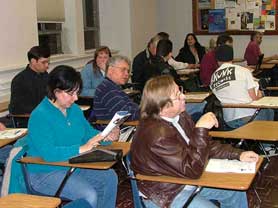 |
| The Oregon and SW Washington Chapter
members relaxed before the March meeting. |
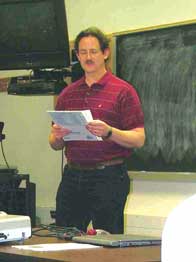 |
| Dave Britton of Hewlett Packard,
Chair of the Oregon and SW Washington Chapter, presided over
the January meeting. |
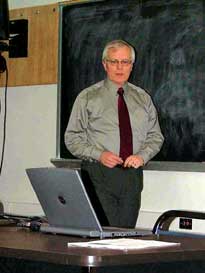 |
| Robert Olsen of WSU traveled from
Pullman, Washington to speak in February at the Oregon and
SW Washington’s Chapter meeting. |
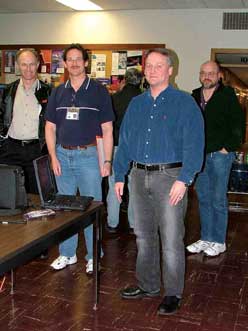 |
| Oregon and SW Washington Chapter
Officers (from left) Chuck Britten, Dave Britton, and William
Moyer visited with speaker Greg Kiemel (second from right). |
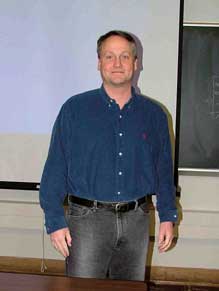 |
| Local talent Greg Kiemel of Northwest
EMC spoke at the March meeting of the Oregon and SW Washington
Chapter. |
Rocky Mountain
The Rocky Mountain EMC Chapter got the 2005 technical program
off to a flying start with 50 people attending the first meeting
in January. The technical presentation was entitled, “Electrostatic
Discharge: A Tutorial.” The meeting was intended as a review
of the basics of Electrostatic Discharge (ESD) and was divided
into four parts. Part 1 consisted of a description of the several
types of ESD events that are created in information processing
equipment and other electronics. Part 2 outlined the various possible
current wave shapes of an ESD event and how each wave shape affects
logic and other electronic circuitry. Part 3 was a general review
of ESD mitigation techniques and briefly explored unique shielding
and grounding issues associated with ESD events. Part 4 focused
on test set-ups, test equipment, and product survivability requirements.
All in all, this was an excellent start to the tenure of Matt
Aschenberg, the new Technical Program Chair of the Rocky Mountain
Chapter. The February meeting was a double header. In the first
presentation, “A Hitchhiker’s Guide to Emissions Testing:
Part 4”, Todd Seeley from IALabs (Boulder, Colorado) ingeniously
merged two different Sci-Fi themes (Hitchhiker/Star Wars) with
the promise of a galactic view on emissions testing. Electromagnetic
Compatibility (EMC) is a discipline that has many obscure technical
facets. Engineers new to the EMC discipline are often confused
by the various options available for testing the emissions from
electronic products. How does one pick between the testing options
- OATS (Open Area Test Site)/GTEM/Semi-Anechoic Chamber/Fully
Anechoic chamber? This presentation gave a top-level understanding
of Normalized Site Attenuation and how it affects testing results
in comparing multiple emissions test sites. The second presentation,
“High-Speed Measurements - a Tutorial Closed the Loop Between
Board Design and Test,” was given by Minh Quach of Agilent.
Mr. Quach designed this presentation to provide engineers with
a practical framework for understanding and performing high-speed
measurements. The talk started with a brief introduction to ideal
(lossless) and lossy transmission lines, interconnects, and the
use of time-domain reflectometry (TDR) and vector network analysis
(VNA) techniques for high-speed measurements. Bandwidth and rise
time considerations were addressed, followed by a detailed discussion
of signal integrity considerations (ground bounce, power bus decoupling,
dispersion loss, AC loss, differential pairs, common/differential
modes, even/odd modes). The talk continued with a discussion of
board-level interconnect components (vias, connectors, sockets,
probe tips, packages, multi-chip modules, PCB traces, single/differential
runs) and concluded with high-speed interconnect modeling consideration.
In March, the Rocky Mountain Chapter was pleased to host Dr. Tom
Jerse, Associate Professor of Electrical Engineering at The Citadel
and IEEE EMC Society Distinguished Lecturer. In this meeting,
Dr. Jerse presented a very elegant effect in EMC – that is
using balance to control the creation of common-mode currents.
First, Tom set the scene with some examples of common structures
and analyzed how emissions can be created with imbalance in the
circuit. Something as simple as a stub on a trace can be a very
effective source of the imbalance. This talk explained, demonstrated,
and quantified how asymmetric structures excite common-mode currents.
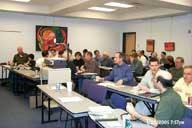 |
| A full house was present at the Rocky
Mountain EMC Chapter meeting in January. |
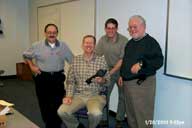 |
| Rocky Mountain Chapter officers (from
left) Chas Grasso, Monrad Monsen, and Mat Aschenberg, gave
special thanks to Bill Ritneour for his January presentation
on ESD testing. |
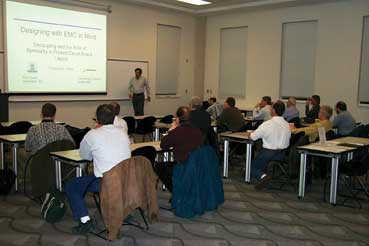 |
| Tom Jerse of The Citadel kicked off
the Rocky Mountain Chapter meeting in March. |
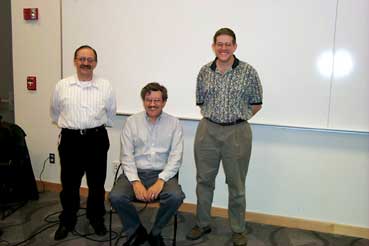 |
| The officers of the Rocky Mountain
Chapter thank Tom Jerse (center) for a great presentation
in March. |
Santa Clara Valley
Darryl Ray reports that the incoming Chapter officers assumed
their new roles starting January 1st. The new officers are: Bert
Chan (Chair), Hans Mellberg (Vice Chair), Dale Gutierrez (Treasurer)
and Oscar Fallah (Secretary). On the first Tuesday of each month,
the administrative committee (ADCOM) meets to discuss Chapter
businesses and prepare for the monthly meetings. Complementary
sandwiches and soft drinks are furnished to all attendees at the
monthly meetings. As a result of its efforts in organizing the
2004 IEEE International Symposium on EMC in Santa Clara, California
(August 2004), the SCV Chapter received a $10,000 surplus appropriation
from the IEEE EMC Society. The SVC Chapter is grateful indeed!
The January meeting presentation was entitled, “Does Position
Matter? - Locating Bypass Capacitors for Effective Power Distribution.”
The speaker was Mr. Steve Weir of TeraSpeed Consulting Group,
LLC. The discussion was presented from a signal integrity point
of view. Many aspects of capacitor placement with respect to power
distribution were discussed. The paper also pointed out the importance
of capacitor placement with respect to good EMC design. The February
meeting topic was “Locating ESD and Other Impulsive Events
by Time of Arrival,” presented by Santa Clara Valley’s
own Doug Smith, Consulting Engineer. Doug set up a high-speed
digital oscilloscope and showed how to locate impulsive events
using a few simple handmade antennas and looking at time delays
of the wave front. Examples were discussed and a live demonstration
was given. A number of interesting horror stories (also known
as case studies!) were shared with the audience. In March, Mr.
Fred Leffingwell, EMC engineer with Cisco Systems, San Jose, California,
gave an informative presentation entitled, “EMC and the Transformer
Center Tap.” Fred’s presentation showed various center-tap
grounding strategies and the trade offs associated with them.
The meeting concluded with a brief discussion of transient suppressors
and their implication on EMC emissions and immunity performance.
Over 40 people attended Mr. Leffingwell’s presentation.
Sendai, Japan
After supporting the “2004 International Symposium on EMC,
Sendai” in June 2004, the Chapter sponsored an “EMC
Sendai Chapter Colloquium.” Professor Ken Kawamata (Hachinohe
Institute of Technology) was invited as the lecturer. Dr. Kawamata
presented his excellent research work on “Wideband measurements
of transients relating to micro-gap discharge phenomena.”
He outlined very interesting measurement results obtained by the
fastest oscilloscope and the widest spectrum analyzer currently
available, applying his distributed circuit model. During the
presentation, helpful discussions took place and encouraging suggestions
were given. In December of 2004, a workshop took place focusing
on PLC (Power Line Communications), which is currently a hot issue
in Japan. Six lecturers made presentations on PLC, including:
1) Overviews by Professor Akira Sugiura
2) Characteristics of Power Lines and PLC by Professor Nobuo Kuwabara
3) EMI Regulations of PLC by Director Fujio Amemiya
4) PLC Systems and their Characteristics by Director Masahiro
Maki
5) Counter Measures for Interferences caused by PLC by Professor
Masamitsu Tokuda
6) Interferences for Radio Astronomy by Professor Takayuki Ono
The 2004 Chapter officers will remain in place for 2005. Moving
forward, the Chapter has also decided to hold colloquia on a bi-annual
basis, in June and in December.
For more details on upcoming Sendai Chapter activities, please
visit them on the web at https://www.topic.ad.jp/emc-sendai/pr-mar2005.html
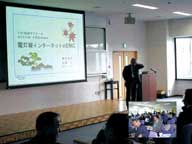 |
| Professor Sugiura gave the opening
greeting of the Sendai Chapter’s PLC workshop. |
Seattle
The Seattle EMC Chapter held a joint meeting with the local IEEE
Microwave Theory and Techniques, Computer, and Communications
Societies. Over 80 people attended this January 27 meeting at
Arrow Electronics in Bellevue. Techlink NW donated pizza for dinner
prior to the meeting. The featured speaker was Dr. Amer Hassan
of Microsoft on “The Future of Wireless LANs: IEEE 802.11n”.
Dr. Hassan noted that Wi-Fi is proving to be an essential technology
for pervasive computing. However, some key issues need to be resolved
to enable some applications enjoyed by end users. His presentation
outlined the current status of the Wi-Fi industry, issues to be
addressed, and how the industry is collaborating to enhance the
user experience. The presentation concluded with a discussion
on the emerging next generation of Wi-Fi, currently referred to
as 802.11n. On February 24, Professor Bob Olsen, Associate Dean
of Washington State University, and Technical Editor of the EMC
Newsletter, gave a presentation titled “Evaluation of RF
Measurement Instruments in Strong ELF Fields.” This topic
was a nice complement to the presentation given by Elya Joffe
on “Electrophobia” at the Chapter’s November meeting.
Professor Olsen is a wonderful speaker who kept the audience alert
throughout his entire presentation. This meeting was held at CKC
Labs in Redmond. Professor Olsen’s experience in front of
an audience was clearly evident as he provided detailed information
on RF survey meters and field measurements. The Chapter appreciated
learning about his expertise on human exposure to radio frequency
electromagnetic fields. On March 29, Northwest EMC came to town
and hosted a wonderful dinner at the Desert Fire restaurant in
Redmond. Jerry Page of Northwest EMC affably greeted the some
20 attendees upon arrival. The featured speaker was Greg Kiemel,
an EMC Society Distinguished Lecturer. He spoke on the topic “Wireless
Medical Telemetry Devices.” It was interesting to see the
examples shown of wireless patient telemetry across a variety
of operational bands. The presentation and the dinner were excellent!
For April, Seattle EMC Chapter Chair Pat André will lead
a Chapter contingency south to Portland for their Colloquium and
Exhibition on April 25. He may just recruit an interesting speaker
or two for future Seattle EMC Chapter meetings!
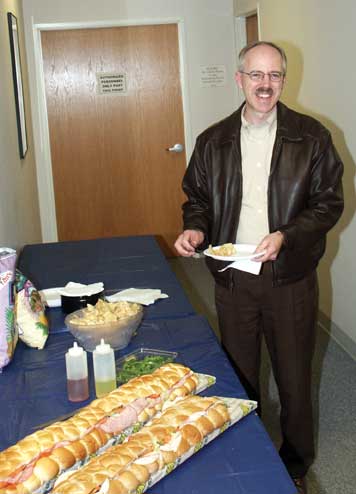 |
| Dave Walen of the FAA is first in
line for the casual dinner held prior to the February Seattle
Chapter meeting held at CKC Labs in Redmond. |
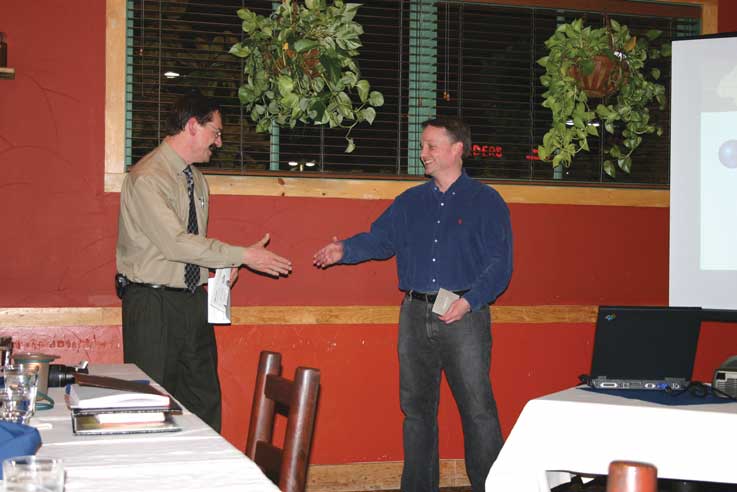 |
| Pat André, Seattle EMC Chapter
Chair, (left) thanked speaker Greg Kiemel of Northwest EMC
for his excellent presentation at the March Chapter meeting. |
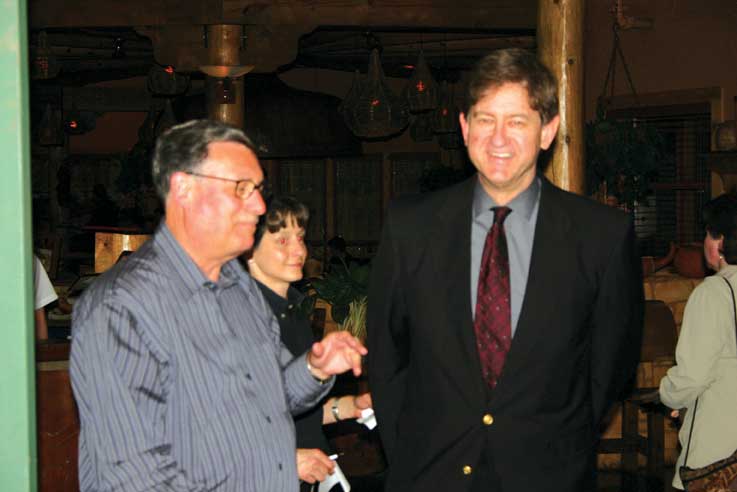 |
| Jerry Page of Northwest EMC visited
with Mark Chase of CKC Labs (right) following the March Chapter
meeting in Seattle. |
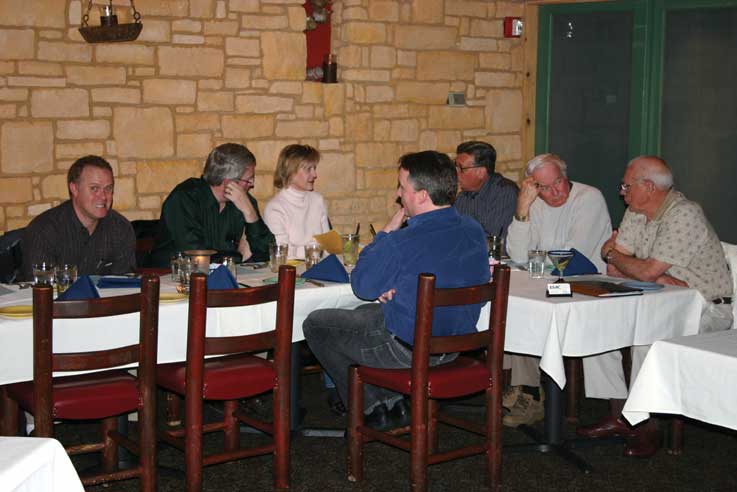 |
| Desert Fire restaurant was the location
of the March Seattle Chapter meeting. |
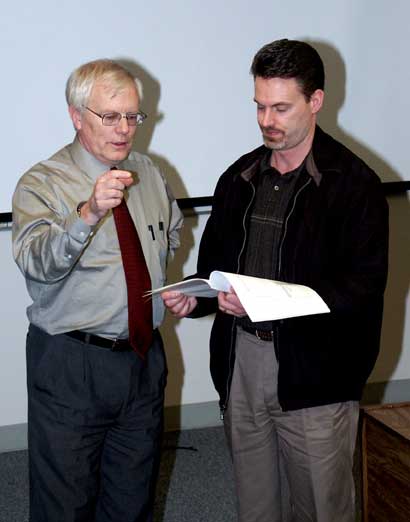 |
| Speaker Bob Olsen of WSU (left) and
Dennis Lewis of Boeing discussed a presentation issue following
the February Seattle Chapter meeting. |
Singapore
Dr. Li Erping, Chapter Chair, reports that the Singapore Chapter
held a meeting on January 14. The meeting venue was the Singapore
Institute of High Performance Computing, where Professor Joungho
Kim, of KAIST (Korea Advanced Institute of Science and Technology),
gave a presentation on Digital Electromagnetic Waves in High-Speed
Digital Packages and PCBs. His talk attracted over 100 attendees
from both industry and academic institutions in this region. In
this talk, Professor Kim presented the fundamental design issues
and challenges associated with the signal propagation, resonance,
and the radiated emission profile of high frequency and high-current
electromagnetic waves. Topics presented included transmission
line effect, crosstalk, resonance, antenna effect, simultaneous
switching noise, skew, and jitter. He also touched on the impact
of the degradation of timing and noise margin, and system reliability.
On March 8, the Singapore Chapter invited Professor Tatsuo Itoh,
from the University of California at Los Angeles, to deliver a
seminar on “Microwave Devices Based on Composite Right/Left-Handed
(CRLH) Transmission Line Metamaterials.” The meeting and
presentation took place at the Singapore Marina Mandarin Hotel.
On March 11, the Singapore Chapter held a technical meeting that
specially addressed organization of the 2006 International Zurich
Symposium on EMC in Singapore. The meeting in particular discussed
the special topics and topical meetings to be included in 2006.
The meeting was well supported by the Chapter members.
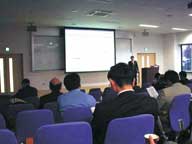 |
| Director Maki presented PLC Systems
at the Sendai Chapter’s December workshop. |
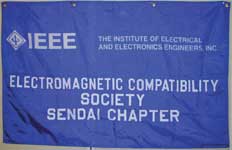 |
| The Sendai EMC Chapter Flag. |
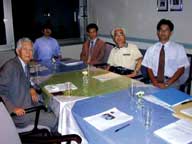 |
| Sendai Chapter officers met after
their EMC Colloquium in late August. |
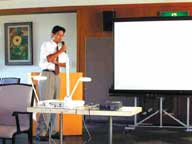 |
| Professor Kawamata presented his
excellent work on micro-gap discharge during the Sendai Chapter’s
EMC Colloquium. |
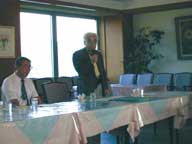 |
| Professor Takagi gave the opening
announcement at the inaugural EMC Sendai Chapter Colloquium.
|
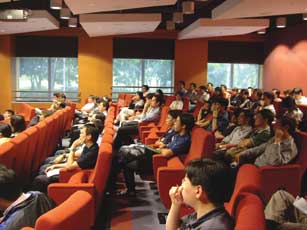 |
| An attentive audience listened to
the presentation by Professor Joungho Kim at the January Singapore
Chapter Meeting. |
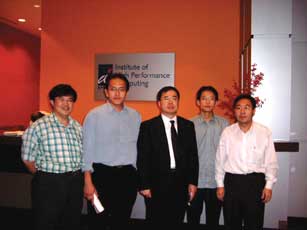 |
| Singapore Chapter officers gather
with the speaker after their January Chapter meeting including
(from left) Timothy Foo, Singapore Chapter Treasurer, Dr.
Linus Lau from Intel, the invited speaker Professor Joungho
Kim, Professor Kim’s student, and Dr. Li Erping, Singapore
Chapter Chair. |
Tucson
The joint Chapter of the IEEE Microwave Theory and Techniques,
Antennas and Propagation, and EMC Societies held a special one-day
event in cooperation with the Antenna Measurement Techniques Association
(AMTA). Titled “Antenna Calibration and Measurements: A Colloquium
and Exhibition,” this regional event was held on Friday,
March 18 at the new JW Marriott Starr Pass Resort in Tucson, Arizona.
The goal of the event was to offer education on antenna measurement
techniques and related topics. Over 70 people attended the event.
Attendee companies represented included Boeing, Raytheon, EG&G,
General Dynamics, Northrop Grumman, and NAVSEA, to name a few.
The new JW Marriott Hotel in the hills of Tucson was a dramatic
setting for this event. All enjoyed the incredible views offered
from this first class setting. And, the food served was excellent!
Following a continental breakfast buffet, the technical program
started with an overview of AMTA and the local Tucson area presented
by Larry Mandeville of Raytheon in Tucson. Larry is Secretary
of the AMTA Board of Directors so he was well qualified to speak
about this small, but growing organization. Next, Joe Vokurka
of March Microwave presented information on antenna and RCS measurements.
Joe traveled from Europe just to speak at this event! Harry Gaul
of General Dynamics C4 Systems in Phoenix then spoke about the
influence of ground plane reflection on antenna calibration and
measurements. Harry is the chair of the Phoenix EMC Chapter. His
presentation was followed by a 75-minute lunch break in the exhibit
area. A buffet overflowing with delicious chicken and beef fajitas,
as well as rice, beans, a variety of salads, and dessert was offered.
Vince Rodriguez of ETS-Lindgren had the daunting task of being
the designated after lunch speaker, but with his interesting topic,
people stayed alert – despite having full bellies! Vince
spoke about anechoic chamber design and rectangular antenna ranges.
He presented a case study that kept the topic informative and
applicable. Lastly, Doren Hess of MI Technologies wrapped up the
day with his presentation on spherical near-field testing of vehicle-mounted
antennas over a ground plane. He presented the topic with applications.
A noted AMTA expert, as well as an experienced speaker, he also
tied in material from the previous presentations to provide a
good summary of how all the topics related and fit together. After
these excellent presentations, the attendees and speakers returned
to the exhibit room for a reception. Once again, the buffet was
overflowing with fish tacos, a cheese platter, a fresh vegetable
platter, and a variety of gourmet pizzas. Everyone was treated
to drink tickets that could be redeemed at the full bar in the
room. The prickly pear margaritas seemed to be a big hit! There
was also a raffle of several great prizes donated by AMTA and
the exhibitors. All the speakers, as well as Carrie O’Shea
and Brent Treadway of Technical Marketing Specialists (TMS) who
handled the registration, were thanked at the conclusion of the
event. The Co-Chairs of the Tucson joint MTT/AP/EMC Chapter, Sarah
Morales and Nicola Splitek, look forward to their next meeting
on May 23, which will feature Nigel Carter of QinetiQ in the UK.
Nigel will be visiting Tucson over May 23-24 to attend the EMC
Society Board of Directors meeting. His expertise related to aerospace
EMC will surely be of interest to the local engineering community.
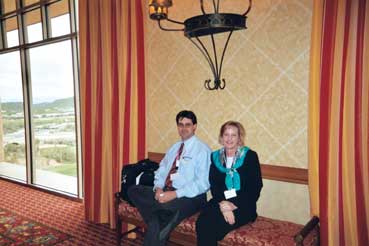 |
| Vince Rodriguez and Janet O’Neil
of ETS-Lindgren appreciated visiting with the AMTA and IEEE
Joint MTT/EMC/AP Chapter members at the Tucson event. |
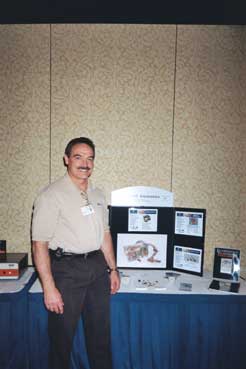 |
| John O’Brien of WEMS Electronics
showcased his company’s EMI/RFI signal line, power, custom,
and space level filters at the Tucson Chapter’s Colloquium
and Exhibition. |
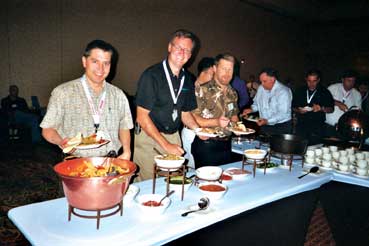 |
| Lunchtime at the Tucson Chapter event
provided a good networking opportunity for Mike Valle of Boeing,
Johannes Ganzert of Rohde & Schwarz, and Bob Bender of
Boeing (from left). |
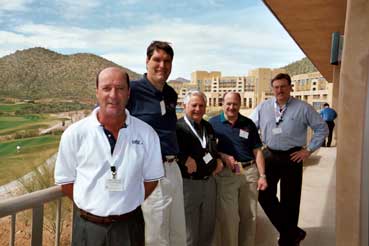 |
| Enjoying the pleasant Tucson weather
are exhibitors John Clutton of Laird Technologies, Bob Ydens
of EMI Solutions, John Detwiler of MI Technologies, David
Turi of Cuming Microwave, and Jack Radavich of S&S Technologies
(from left). |
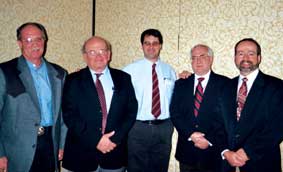 |
| Speakers at the Tucson Chapter event
included (from left) Larry Mandeville of Raytheon, Joe Vokurka
of March Microwave, Vince Rodriguez of ETS-Lindgren, Don Bodnar
of MI Technologies, and Harry Gaul of General Dynamics. |
United Kingdom and Republic of Ireland
Tony Swainson reports that the Chapter has continued to flourish,
with an interesting program of four meetings each year. Meetings
usually include technical presentations on topics of current interest
and where possible, venues are selected which have a broad appeal
and can offer some more general interest after the technical business.
One of the highlights of the year was a meeting held on June 23,
2004 by special arrangement at the Science Museum Annex, which
is on an unused airfield at Wroughton near Swindon in Wiltshire.
In spite of the awful weather, 39 people attended. The technical
session was on the theme of circuit board EMC with presentations
from Tony Maddocks and Martin Ganley of ERA, Tim Jarvis of RadioCAD
and Markus Bueker of Zuken EMC. Nigel Carter then introduced presentations
on “EMC History” by Gerry Jackson and Dave Bull, old
hands who probably needed no introduction. The history lesson
was very appropriate to the atmospheric surroundings, which included
many historic aircraft. After an excellent buffet lunch there
was a guided tour of the exhibits in the large hangar where the
morning session had been held. This part of the collection included
early wheeled-vehicles, bicycles, and historic aircraft. It was
a tantalizing glimpse of just a small part of the collection.
It is hoped that there will be an opportunity to see more of the
Wroughton site in the future.
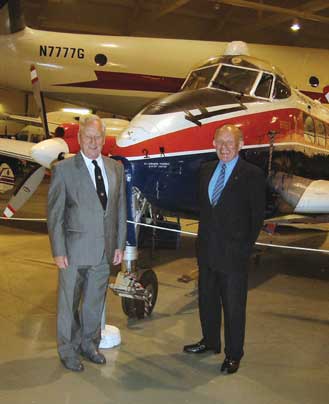 |
| Presenters Gerry Jackson (left) and
Dave Bull at the June meeting of the United Kingdom and Republic
of Ireland EMC Chapter. |
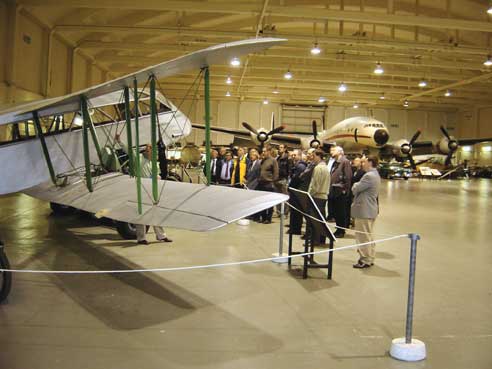 |
| Did that really fly? These
were the types of questions pondered during the June meeting
in the UK. |
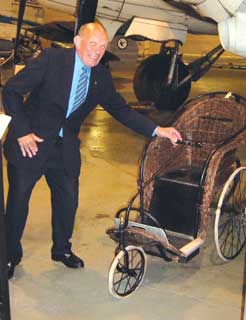 |
| Dave Bull checked the compatibility
of one of the exhibits during the UK and Republic of Ireland
Chapter meeting. |
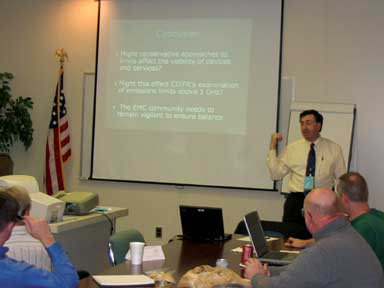 |
| Julius Knapp of the FCC discussed
new technology EMC regulatory challenges with the Washington
DC/Northern Virginia Chapter in March. |
Washington DC/Northern Virginia
Mike Violette of Washington Labs reports that the Washington DC/Northern
Virginia Chapter held its bimonthly meeting on March 17 at the
FCC’s Laboratory in Columbia, Maryland. There were 31 attendees.
Mr. Julius Knapp, Deputy Chief of the FCC’s Office of Engineering
and Technology, gave a talk entitled: “EMC Challenges in
a Rapidly Changing Spectrum Environment.” In his presentation,
Mr. Knapp discussed how a number of recent matters before the
FCC have raised fundamental policy questions relative to EMC,
such as how to define harmful interference and what levels of
interference protection levels are appropriate for services that
rely on reception of extremely weak signals. Mr. Knapp also discussed
some of the EMC challenges posed by the introduction of new technologies
such as ultra-wideband devices, dynamic frequency selection to
facilitate sharing of spectrum between unlicensed devices and
Department of Defense radars, smart antennas, and cognitive radio.
As the FCC’s mandate is to protect users of the RF spectrum,
it has enacted regulations covering all manner of intentional
and unintentional emitters. However, rule-making often becomes
very narrowly focused towards protecting either particular service
providers who have either purchased large segments of spectrums
or incumbent users; these rulemakings have and will continue to
levy strong restrictions on new technologies—with the intent
to protect existing services—which may hamper development
and deployment of new services. A key admonition to EMC professionals
was to be ready to participate in these processes so that the
regulations are realistic and do not become overly restrictive.
EMC
|

































































